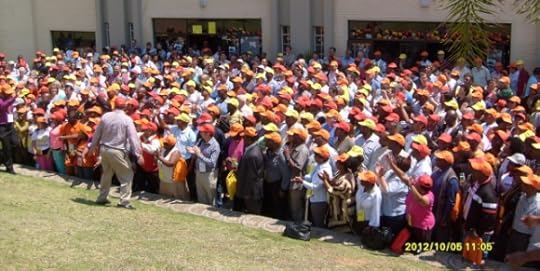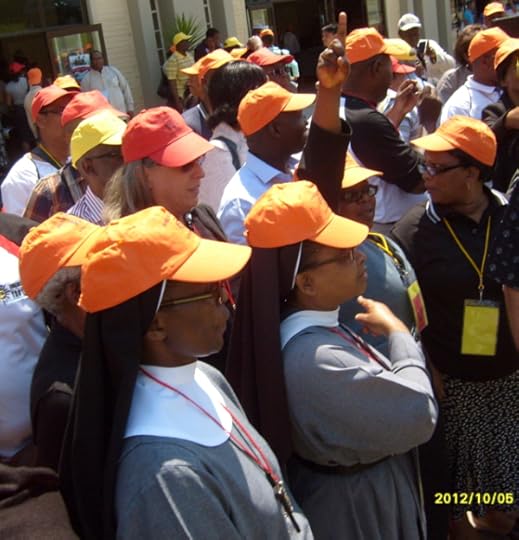Anglicans Ablaze, Part II
For the last couple of days I’ve been attending the Anglicans Ablaze conference in Bryanston, Johannesburg, mainly as part of my research into
the history of the charismatic renewal in Southern Africa.
I’ve already blogged about it here,but here are a few more observations, and some pictures.
There was a sprinkling of old fogeys, like me, who probably remembered the charismatic renewal of the 1970s, but there was a large majority of young
people, most of whom could probably barely remember the apartheid era.

Some of those who attended the Anglicans Ablaze conference this week.
The charismatic renewal is alive and well in the Anglican Church in southern Africa, and probably more healthy than it was in the past.
Many speakers said that the old sense of renewal on the one hand and social justice on the other has been cast into the past.
Also, in the past, outside a few places like Zululand and the Eastern Cape, the charismatic renewal was perceived as predominantly white. Now it
quite clearly isn’t.
One thing that wasn’t explicitly mentioned, but was strongly implicit throughout, is that it is now unashamedly denominational. Back in the
1970s the charismatic movement was strongly ecumenical, with many speaking of the Holy Spirit breaking down barriers between denominations,
especially between Pentecostals and non-Pentecostals.
That went sour in the 1980s, with the rise of the Neopentecostal denominations, which many Pentecostals and charismatics joined. Perhaps it was ironic that the conference was held on the premises of a Neopentecostal church.
I don’t remember anything like Anglicans Ablaze happening back in the 1970s and 1980s. There were ecumenical conferences, but never denominational ones. Yes, groups like IViyo in Zululand held conferences, but they were a particular organisation, and did not include all
Anglicans.

Sisters of the Community of the Holy Name in Zululand at the Anglicans Ablaze conference
And a youth leader reported from the Provincial Youth Council, which had met shortly before, saying that the youth were not the church of tomorrow
but the church of today, and wanted teaching so they could be more certain of their Anglican identity.
Many of those who chaired plenary sessions and introduced speakers were young people, who seemed far more confident than those of earlier generations. The theme was “a generation rising up”, and indeed it is.
A speaker from Nigeria, Grace Samson-Song, pointed out some of the differences between the generation rising up and previous generations:
10 years ago only doctors and drug dealers had cell phones
when did you last see a roll of film?
green was the colour of a crayon, now it’s a lifestyle
how many of you don’t have anything made in China in your house?
reality TV – you watch TV differently
most viewers of porn on the Internet are boys aged 12-16
but social media have overtaken porn as the most popular sites
In spite of this growth in the use of social media by the generation rising up, there were very few tweets on Twitter with the #AnglicansAblaze hashtag, of the percentage of young people there matched the proportions in the populatio0n as a whole.





